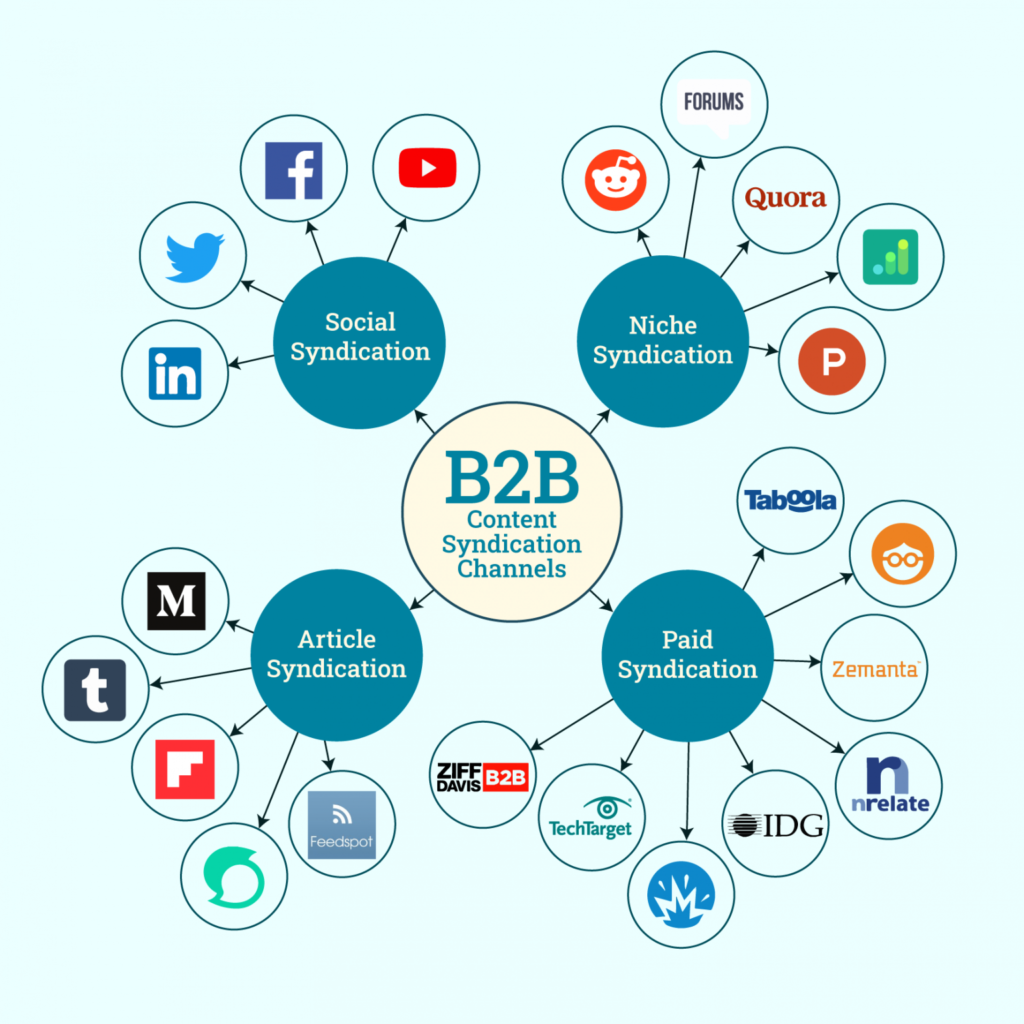The Power of Content Syndication: Scale, Influence, and Reach

Table of Contents
- What is Content Syndication?
- Who Can Benefit from Content Syndication?
- Why Content Syndication Is Important In Terms of Scale, Influence & Reach
- Most Popular Content Syndication Platforms & Networks
- The Added Power of Syndication & How it Works
- Key Takeaways
- Conclusion
- FAQs
Content syndication is the present and future of effective marketing that benefits not just businesses but consumers at large.
Every day, the Internet is flooded with new content from all over the world – some effective and others not so cool. What does this all mean? Thousands of content creators put in a massive volume of effort to come up with compelling content. But only a few get noticed. Why? Because they have adapted to content syndication. This is an extremely effective and economical way to get your brand recognized by leveraging the power of cross-promotions and digital marketing. Content syndication can also increase your SEO score significantly if done right.
What is Content Syndication?

To understand content syndication, you must first understand how it fits in modern-day growth marketing. What you do in content syndication is recycle any web-based content by republishing it on a third-party website. When you syndicate a piece of content, you simply take the same piece of information from one site and republish it on others, but with permission. So it is not plagiarized. In a syndicated post, the source is generally mentioned in principle with the rules of content syndication.
You can syndicate all sorts of digital content like blog posts, articles, videos, infographics, etc. It has a three-fold advantage:
- For the creator, it is free exposure.
- For the third-party website, it is free and relevant content.
- For the business, it is the boost in organic traffic through relevant backlinks.
Content syndication marketing is not a new concept. It was there before the era of digital marketing, but the Internet has definitely scaled the reach and influence manifold.
Who Can Benefit from Content Syndication?

Businesses, in general, can enjoy the benefits of content syndication. This is dependent on the adoption of the right syndicate and the identification of the right audience. There are, however, certain types of business that stand to gain more. For example, businesses already engaged in substantive thought leadership content stand to gain immediately. Businesses like B2B technology brands, on the other hand, may come up with excellent content but with little interest amongst audiences to read it.
Why Content Syndication is Important in Terms of Scale, Influence & Reach
Producing excellent and relevant content is not enough. If your content doesn’t reach wider audiences, it can’t have the desired effects that your strategy is looking to achieve. Content syndication is important because it helps in the following ways:
- It obtains referral traffic.
- It helps to improve brand recognition.
- It is cost-effective.
- It has a wide outreach.
- It improves SEO performance.
- It helps in organic growth.
You can also syndicate content for videos and infographics and provide a ready profile for your consumers.
Most Popular Content Syndication Platforms and Networks

A good content syndication strategy allows you to increase your reach to wider audiences with creative and relevant content. Be it video content or infographics, knowledge about content syndication networks gives you an upper hand in choosing the right platform. Take a look at some of the most popular content syndication platforms below:
- YouTube for video syndication
- Piktochart for infographics
- Inbound.org for inbound marketing
- Medium for photos, videos, blogs, etc.
- SlideShare for multidisciplinary professional content
- Quora community
- Facebook Business
Does Content Syndication Impact Your SEO Score?
The short answer to that question is YES. Since you are recycling original content as part of your content syndication strategy, it might adversely impact SEO for a webpage. Google can easily recognize any duplicated version of the same content, which might drive down your SEO rank. Google only indexes one version of the content, which is typically the one appearing on the website with higher traffic. So, make sure you increase your website traffic using content syndication to ensure the SEO is optimum.
The Added Power of Syndication and How it Works
The process of providing content syndication is pretty standard. Most service providers follow the CPL or Cost Per the Lead model, which allows customizing for each campaign. The more specific this targeting, the higher the CPL charged.
You can try out content syndication with the third party with a smaller budget and optimum results as a business owner. The experts will get the work done within that, allowing you to make your own assessments.
Content syndication strategy has spillover effects in other marketing domains such as intent marketing, which leverage the reach generated by syndicated content.
Key Takeaways
The advantages of content syndication are undeniable. And considering the industry is ever-evolving, the scope of this approach can only be imagined. So, if you are considering adopting this innovative approach, here is a summary of why you must.
- Content syndication is an effective and economical alternative to other marketing approaches.
- Syndicated content can increase your reach to a wider audience.
- Any business can use syndication to increase their reach and scale.
- You can outsource your syndication on a CPL basis to a third party.
- There are specialized content syndication networks to recycle different types of content.
- Syndicated content can negatively impact SEO, but it can be countered by increasing your web traffic.
Conclusion
Content syndication is a valuable process to republish content and build your website’s traffic. Use it wisely, ethically, and soundly to get the best results.

FAQs
It is a marketing method to republish a piece of content on third-party sites to reach a wider audience.
You can syndicate all types of digital content like blogs, videos, infographics, articles, etc.
Duplicating content on the web can drive down your SEO if traffic is not increased on your own website.
There are three broad types of syndicating content –
1. Republish your own content on a third-party site.
2. Republish another site’s content on your own site.
3. Self-service syndication.
Yes. It is legal as long as you provide proper attributions.
Syndicated content can help businesses build brand awareness, reach a wider target audience, generate leads, implicitly promote products, etc.
Latest Blogs
Explore how Google’s 2025 AI search updates triggered ranking chaos. Learn actionable strategies to adapt your SEO for AI Overviews, zero-click searches, and SERP volatility. Stay ahead now.
Learn how to rank on AI search engines like ChatGPT, Perplexity, and Gemini by optimizing your content for authority, structure, and relevance. Stay ahead in AI-driven search with this strategic guide.
Explore the best healthcare SEO services for your medical practice. Improve online visibility and effectively reach more patients in need of your services.
Get your hands on the latest news!
Similar Posts

Content Marketing
4 mins read
11 Best B2B Content Marketing Agencies for B2B Companies in 2024

Content Marketing
5 mins read
Top ecommerce Marketing Agencies with Proven Strategies for 2024

Content Marketing
5 mins read